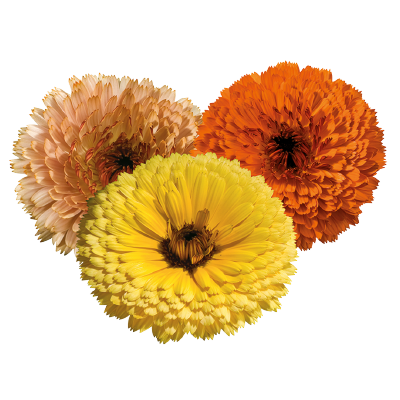
Touch of Red
- Crop Time
- Spring: 9 - 10 weeks
- Height ∅
- 24 ″ / 60 cm
- Exposure
- Sun
- Seed Form
- Raw Seed
- Best Uses
- Bedding, Cutflower
Culture guide
Usage
Cut flower, border and mixed container
Sowing method
1-3 seeds per plug
Germination
5-10 days at 70 °F (21 °C), cover seed lightly with vermiculite after sowing.
Growing on
Transplant plugs after 2-3 weeks. Grow on at 50-55 °F (10-13 °C). Calendulas are cool weather plants that are best produced for spring or early fall sales.
Media
Use a well-drained, growing substrate with 10-30 % clay, 0-15 % parts (e.g. bark, sand, perlite), 1-1,5 kg /m³, complete balanced fertilizer. Iron-chelate, micronutrients, pH 5.8-6.5. Field: humus, loamy soils with good drainage and good nutrition levels, Standard fertilization: 50-80 g/m² slow release fertilizer.
Fertilization
High fertilization levels are required. Fertilize the crop weekly with 100-200 ppm nitrogen (at 2 kg/m³ slow release fertilizer in substrate), using a complete balanced fertilizer. Avoid high ammonium and high nitrogen levels. High nitrogen levels cause delay in flower initiation and smooth stems. Prevent magnesium deficiency by applying magnesium sulphate (0,025%) 1-2 times and in case of iron deficiency apply Fe-Chelate for 1-2 times. Field: begin two weeks after transplanting with fertilization (see above).
Stage I Starts with the radicle breaking through the testa. The roots are touching the medium. Ends with fully developed cotyledons.
Stage II Starts from fully developed cotyledons. Ends with the fully developed true leaf or true leaf pair.
Stage III Starts from the fully developed true leaf or true leaf pair and ends with 80% of the young plants being marketable.
Stage IV All young plants are ready for sale and in the process of being hardened off. This stage lasts about 7 days.
The cultural recommendations are based on results from trials conducted under Central European conditions. Different conditions in other parts of the world may lead to deviations in results achieved.



